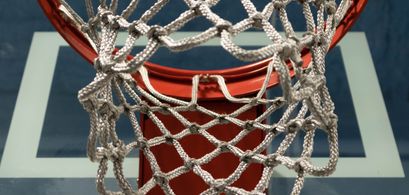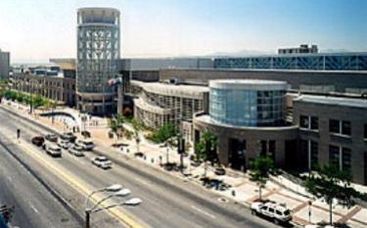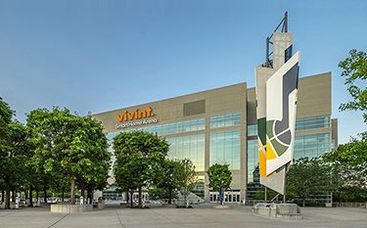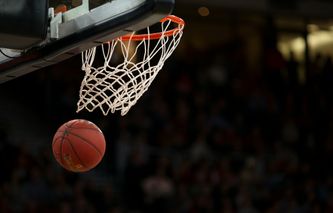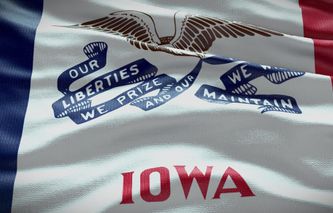41st Season
First Game Played October 12, 1979
301 West South TempleSalt Lake City, UT 84101
Tel. (801) 325-2500
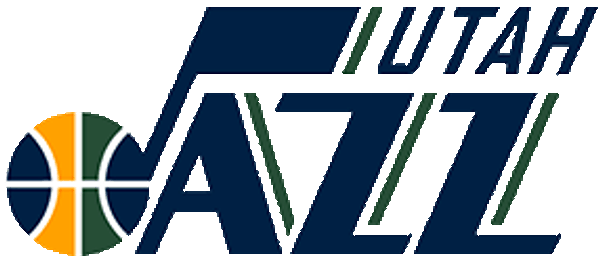
Historical Moments
1979/80:Utah had been home to one of the more successful teams in the ABA known as the Stars who won the Championship in 1971 and made it to the Finals again in 1974 before folding a year later. Despite the success on the court many questioned if an NBA team could be successful in Utah as the Jazz left the Bayou for Salt Lake. Despite no history of Jazz music in Utah the name was kept in a cost saving move. After losing their first game on the road to the Portland Trailblazers the Jazz were beaten by the Milwaukee Bucks in their first game at the Salt Palace on October 15th. The Jazz would get their first win in Utah a week later when they beat the San Diego Clippers 110-109. However, the wins would not come often for the Jazz as they finished in last place in the Midwest Division with a 24-58 record. However, an important step was taken to improve the team as Frank Layden is hired as the team’s new General Manager. One of Layden’s first moves was to acquire high scoring forward Adrian Dantley from the Los Angeles Lakers who finished third in the league in scoring with 28.0 ppg.
1980/81:The Jazz selected Darrell Griffith with the second overall pick in the NBA draft together with Adrian Dantley the duo would give the Jazz a solid 1-2 scoring punch as Dantley won the league scoring title with 30.7 ppg, and Griffith took Rookie of the Year honors with 20.6 ppg. However the Jazz still struggled finishing in fifth place with a 28-54 record.
1981/82:Adrian Dantley continued to carry the Jazz with 30.3 ppg good enough for third in the NBA. However, the Jazz continued to struggle as General Manager Frank Layden took over as Coach, during a miserable last place season that included an 18-game losing streak on the way to a 25-57 record.
1982/83:With the third pick in the NBA Draft the Jazz select Dominique Wilkins who expressed displeasure with playing in Utah as he was traded before ever playing a game to the Atlanta Hawks for John Drew, Freeman Williams, and cash. Adrian Dantley continued to be the best player for the Jazz as he scored 57 points in an early season game against the Chicago Bulls. However, just 22 games into the season Dantley would be lost for the season with torn ligaments in his wrist. Without Dantley the Jazz would struggle again finishing in fifth place with a 30-52 record.
1983/84:The Jazz play several games in Las Vegas as they finally have some success on the court making the playoffs for the first time in franchise history while winning the Midwest Division Title with a 45-37 record. Leading the way again is Adrian Dantley who captures the NBA scoring title with 30.6 ppg. However, Dantley had some help this time as Mark Eaton led the NBA in blocked shots, Rickey Green led the league in steals, and Darrell Griffith led the league in three point shooting. In their first playoff series the Jazz would have to rally to win their last two games to beat the Denver Nuggets in a hard fought five game series. However, in the second round there would be no comeback as the Jazz are beaten by the Phoenix Suns in six games.
1984/85:In the NBA draft the Jazz select little-known Guard John Stockton of Gonzaga University. Though few knew it at the time it would be one of the best mid first round finds in the history of the NBA draft. However, while Stockton developed the Jazz struggled as Adrian Dantley staged a prolong holdout and John Drew was suspended. However the Jazz would still sneak into the playoffs with a 41-41 record. In the playoffs the Jazz would stun the Houston Rockets in five games despite losing Defensive Player of the Year Mark Eaton to knee injury. However, in the second round the Jazz would be blitzed by the Denver Nuggets in five games.
1985/86:The Jazz make another blockbuster selection in the draft picking Karl Malone out of Louisiana Tech with the 13th overall pick. Malone and Stockton who was selected a year earlier would become one of the most dynamics duos in NBA history. However, Adrian Dantley was still the star of the team and he had another solid season finishing second in scoring with 29.8 ppg as the Jazz made the playoffs for the third straight year with a 42-40 record. However in the playoffs the Jazz would make a quick exit as they are beaten by the Dallas s Mavericks in four games.
1986/87:The Jazz decided to retool shipping Adrian Dantley to the Detroit Pistons for Kelly Tripucka and Kent Benson. The move allowed Karl Malone to take over the team lead in scoring with 21.7 ppg. In the playoffs the Jazz appeared to be well on their way to the second round as they took the first two games against the Golden State Warriors. However, the Warriors would storm back to win the next three games and the series.
1987/88:The young Jazz struggled in the second half but finished the season on as strong not posting an 11-5 record in March and winning their final five games to finish with a 47-35 record good enough for third place and their fifth straight playoff appearance, as John Stockton led the league in assists for the first time in his career setting a single season record with 1,128 assists. In the playoffs the Jazz would overcome a Game 1 loss to beat the Portland Trailblazers in four games. In the second round the Jazz would face the Los Angeles Lakers who were expected to run through the NBA on their way to a second straight title. However the young Jazz gave the Lakers a scare taking the series all the way to a seventh game before bowing out with a 109-98 loss.
1988/89:Just 17 games into the season Coach Frank Layden would step down to take over the position of club president. Taking his place on the bench would be assistant Coach Jerry Sloan. Despite the change the Jazz continued to improve as “The Mailman” Karl Malone delivered the Jazz a division title with a 51-31 record by finishing second in scoring with 29.1 ppg. However, in the playoffs the Jazz would be stunned by the Golden State Warriors as they were swept in three straight games.
1989/90:Karl Malone continues to certify himself as one of the top players in the game as he finishes second in scoring again with 31.0 ppg, as John Stockton leads the league in assist for the third year in row. The duo would lead the Jazz to an impressive 55-27 record, which was good enough for second place. However, in the playoffs the Jazz would have another let down as they are beaten by the Phoenix Suns in five games.
1990/91:The Jazz continue to play sweet music in the regular season falling one game short of the division title with another stellar record of 54-28 as Karl Malone finishes second in scoring and John Stockton leads the league in assists again. In the playoffs the Jazz would make get a measure of revenge by beating the Phoenix Suns in four games. However, in the second round the Jazz would be tripped up by the Portland Trailblazers in five games.
1991/92:The Jazz reaped the awards of eight straight playoff appearances and a growing fan base by getting a brand new state of the art arena known as the Delta Center in downtown Salt Lake. The Jazz would get off to a slow start as they posted a 9-7 record in November. However, the Jazz would get hot and would capture the Midwest Division by eight games with a 55-27 record, as Karl Malone finished second in scoring and John Stockton led the league in assist for the fifth straight season. In the playoffs the Jazz would shake off a pesky challenge from the Los Angeles Clippers in a five game series before dominating the Seattle Supersonics in five games to reach their first conference final in franchise history. In the Western Conference Finals against the Portland Trailblazers the Jazz would drop their first two games on the road. However, in Utah it would be a different story as the Jazz won the next two games at the Delta Center to even the series. After dropping Game 5 back in Portland the Jazz needed another home win to force a seventh game. However, the Jazz seemed to run out of gas as they fell by eight points. Following the season Malone and Stockton would be part of the Dream Team that captured the gold medal in the Olympics played in Barcelona, Spain.
1992/93:The NBA’s best players came to Utah as the Delta Center hosted the All-Star Game, as the Jazz dynamic duo of John Stockton and Karl Malone stole the show sharing MVP honors as the Western Conference won in overtime. Malone and Stockton continued to be among the best players in the NBA. However, playing without Mark Eaton for most of the early part of the season the Jazz slipped in the standings finishing in third place with a 47-35 record as the Jazz failed to win 50 games for the first time in five years. In the playoffs the Jazz would get off to a solid start as they were on the verge of upsetting the Seattle Supersonics by taking two of the first three games. However, the Sonics would recover and win the series in five games. Following the season Mark Eaton would announce his retirement.
1993/94:John Stockton leads the league in assists for the seventh straight season one short of the record held by Bob Cousey as Karl Malone starts to climb the list in all-time points scored topping the 19,000 mark. However, the biggest move came at the trade deadline as the Jazz acquired Jeff Hornacek from the Philadelphia 76ers for Jeff Malone. Upon landing Hornacek the Jazz became the hottest team in the NBA winning ten straight games in February and eight of the last nine games to close the season with a 53-29 record that landed them in third place in the Midwest Division. In the playoffs the Jazz continued to roll as they beat the San Antonio Spurs in four games, winning three straight games after dropping Game 1. In the second round the Jazz continued to roll as they jumped out to a 3-0 lead over the Denver Nuggets. However, the Nuggets would rally and force a seventh game. The Jazz would win Game 7 by a score of 91-81 to make the Conference Finals. However, the Nuggets near comeback would clearly affect the Jazz as they were easily beaten by the Houston Rockets in five games.
1994/95:In a year of Milestones John Stockton becomes the NBA’s all-time assist leader passing Magic Johnson with 9,921 on his way to a record tying eighth straight assist title. Meanwhile Karl Malone and Tom Chambers each passed the 20,000-point mark in their career, as the Jazz recorded a franchise best record of 60-22 while finishing in second place in the Midwest Division. However, the Jazz would be stunned in the playoffs by the Houston Rockets in five games blowing a 2-1 series lead to the defending NBA Champions who were blasting off to a second straight title.
1995/96:John Stockton has another record breaking season leading the NBA in assists for the record ninth season while breaking Maurice Cheeks career record in steals. Meanwhile Karl Malone moves in ninth place in all-time scoring as the Jazz finish in second place again with a solid record of 55-27. In the Jazz got off to a fast start by beating the Portland Trailblazers in the first two games at home. However, the Blazers would win both games in Portland to force a fifth game. Faced with another playoff collapse the Jazz issued a statement beating the Blazers by an impressive 102-64 score. In the second Round the Jazz continued to play strong basketball as they beat the Midwest Division Champion San Antonio Spurs in six games. In the Western Conference Finals for the third time in five years the Jazz faced the Seattle Supersonics. Once again it looked as if the Jazz would bow out of the Conference Finals without a fight as they fell behind three games to one. However, the Jazz would rally and force a seventh game. In Game 7 at Seattle the Jazz would give the Sonics all they could handle before falling by four points.
1996/97:Although keeping the name Jazz the team gets a logo that more closely reflects the state of Utah featuring purple mountains, and sky blue in the script. The new colors seemed to agree with the Jazz as they dominated the Western Conference with a franchise best record of 64-18, as Karl Malone took home MVP honors. In the playoffs the Jazz would get off to a flying start dominating the Los Angeles Clipper in three straight games. In the second round the Jazz continued to roll easily knocking off the Los Angeles Lakers in five games. In the Conference Finals the Jazz got off to a fast start taking the first two games against the Houston Rockets. However, as the series shifted to Houston the Rockets evened the series at two games apiece as Eddie Johnson hit a dramatic buzzer beater to win Game 4. Back home for Game 5 the Jazz took a 3-2 series lead with a hard fought win at home. Game 6 in Houston would be another battle and appeared to be heading for overtime as John Stockton nailed a three point buzzer beater that launched the Jazz into the NBA Finals. In the NBA Finals the Jazz faced the Chicago Bulls losing the first two games on the road. However, the Jazz upon arriving at the Delta Center continued their home court dominance by taking Game 3 and Game 4 to even the series. With a chance to take a series lead in Game 5 the Jazz were beaten by a heroic performance by Michael Jordan playing with a flu like ailment 90-88 Back in Chicago for Game 6 the Jazz battled the Bulls tightly before falling by four points as the Bulls won their fifth title in seven years.
1997/98:As the season started the Jazz were forced to play without their playmaker John Stockton who had off-season knee injury. Without Stockton the Jazz would limp along with a record of 11-7. However, upon his return the Jazz reestablished themselves as the power in the West with a league best record of 62-20. In the playoffs the Jazz were tested early by the Houston Rockets who jumped out to a 2-1 series lead. However, the Jazz facing elimination would rally with two strong performances to win the series in five games. In the second round the Jazz would find things easier as they beat the San Antonio Spurs in five games for their third trip to the Western Finals in a row. The Jazz continued to roll in the Conference Finals as they swept the Los Angeles Lakers in four straight games to set up a rematch with Chicago Bulls. With home court advantage the Jazz were favored by many to end the Bulls dynasty, as they took Game 1 at the Delta Center. However the Bulls would rally to take Game 2 and jumped out to a 3-1 series lead by taking the first two games in Chicago. Facing elimination the Jazz edged the Bulls by two points to send the series back to Utah. In Game 6 the Jazz had a late lead, but Michael Jordan playing in his final game with the Bulls single handily led the Bulls to 87-86 win hitting the game winning shot with two seconds left.
1998/99:Hoping a third time would be a charm, as the Chicago Bulls were broken up the start of the Jazz season was delayed by a four month lockout that wiped out half of the season. When the season finally started the Jazz got off to a flying start winning their first six games on the way to a 19-4 start. The Jazz would struggle a bit down the stretch as they lost their grip on first place. Karl Malone would win his second MVP in three years as the Jazz posted a league best record of 37-13. However, the Jazz record was tied by the San Antonio Spurs who won the division by a tiebreaker. In the playoffs the Jazz were given a scare by the upstart Sacramento Kings who had a 2-1 series lead and had the Jazz on the edge of elimination in Game 4. However, the Jazz would rally to win the game in Sacramento by one point to force a decisive fifth game at home. The Jazz would win Game 5, but their struggles would continue into the second round as they are beaten by the Portland Trailblazers in six games.
1999/00:The Jazz who now were the oldest team in the NBA still led by John Stockton and Karl Malone recaptured the Midwest Division with a solid record of 55-27. In the playoffs the Jazz got off to a quick start by beating the Seattle Supersonics in the first 2 games at home. However as the series shifted to Seattle the Sonics rallied to tie the game and force a 5th game. In Game 5 back at the Delta Center the Jazz held off the Sonics by 3 points to advance to the second round. In the second round the jazz would run out of gas as they fell behind 3-0 to the Portland Trailblazers before falling in 5 games.
2000/01:After 2 straight second round exits the Jazz decided to retool as Jeff Hornacek retired and Howard Eisley was dealt away in a 3-team deal that saw Donyell Marshall come to the Jazz. In addition the Jazz signed veteran free agents Danny Manning and John Starks along with former Jazz David Benoit as well as welcoming 19-year-old DeShawn Stevenson, their first round pick in the 2000 NBA Draft and first ever high school player to the club. The Jazz remained one of the strongest teams in the NBA posting a solid 53-29 record while finishing in 2nd place. Along the way John Stockton sets a record for most games played with one team and Karl Malone moves into 2nd place on the all-time scoring list with 31,420 points. In the playoffs the Jazz would get off to a solid start taking a 2-0 lead over the Dallas Mavericks. However, the Mavs would rally to force a 5th game by winning the next 2 games in Dallas. Back in Utah for Game 5 the Jazz would be stunned by the upstart Mavericks who ended the Jazz season with a dramatic 84-83 win.
2001/02:John Stockton continues to set new standards with 15,000 career assists and 3,000 career steals, as Karl Malone scored his 34,000th career point. However, the Jazz begin to show their age as they finished in fourth place with a 44-38 record, making the playoffs for the 18th straight season as the eighth seed. In the playoffs the Jazz would give the Sacramento Kings all they could handle before losing in four games. The Jazz three losses came by a combined total of 11 points.
2002/03:In a season that marked the end of the Stockton and Malone era the Jazz remained a strong playoff contender posting a solid 47-35 record. However, in the competitive Western Conference it was only good for the seventh seed, which meant another playoff match-up with the Sacramento Kings. The aging Jazz were clearly overmatched as they ended up winning just once in five games. However, both John Stockton and Karl Malone were given long standing ovations as they walked off the court at the Delta Center following a Game 4 loss. They would also be given a standing ovation by fans in Sacramento as Game 5 ended. Following the playoff John Stockton would announce his retirement, ending his career with the all-time NBA records in assists with 15,806 and steals at 3,265. However the most amazing stat surrounding Stockton was his durability as he missed just 22 games in 20 seasons. With Stockton’s retirement and the Jazz in a rebuilding mode, Karl Malone signed with the Los Angeles Lakers to peruse the Championship that eluded him in his 19 years in Utah. In his career with the Jazz Malone scored 36,374 points good enough for second all time in the NBA, as he needs just 2,013 to break Kareem Abdul-Jabbar’s record.
2003/04:Without their dynamic duo of Stockton and Malone not much was expected out of the Jazz entering the season. However with new stars like Andrei Kirilenko picking up the slack, the Jazz were competitive all season. With the exception a slump in January and February the Jazz remained at or above .500 all season as they battled the Denver Nuggets for the last playoff spot in the Western Conference. The Jazz would end up falling just one game short of their 21st straight appearance in the playoffs as they ended up in last place in the completive Midwest Division, with a 42-40 record, that considering the circumstances had to be considered a successful season.
2004/05:Hoping to boost their offense the Jazz signed Free Agent Carlos Boozer away from the Cleveland Cavaliers. Boozer was as good as the Jazz hoped as he led the team in scoring and rebounding in each of the first three games as the Jazz won six of their first seven games. However, when a knee injury forced Andrei Kirilenko to the sidelines Boozer struggled and so did the Jazz, as they posted a 3-12 record in December. Hoping to revitalize the team and get a stronger in the middle, the Jazz traded Carlos Arroyo to the Detroit Pistons for 6-11 Center Mehmet Okur. The move would not save the season as by the time Kirilenko returned the Jazz were in last place, where they would finish with a 26-56 record.
2005/06:The Jazz continued to re-tool before the season as they reacquired Greg Ostertag, as Raja Bell left to sign with the Phoenix Suns. When the season returned it was Carlos Boozer who was missed the most as he sat out the first 49 games recovering from foot and hamstring injuries. Without Boozer, the Jazz would get off to a slow start posting an 11-16 record through 27 games. When Boozer returned the Jazz still struggled as players expressed unhappiness with Jerry Sloan’s coaching style. Despite all the problems with Sloan and the players, and injuries at the end of the season the Jazz were one of the strongest teams in the Western Conference as they won seven of their last ten games. However, they would fall three games short of a playoff spot as they posted a record of 41-41.
2006/07:After just missing out on a playoff spot the Jazz entered the season, with a deep well rounded team that came flying out of the starting gate, winning 12 of their first 13 games. One player who emerged early was Deron Williams who became the playmaker the Jazz had been looking for since John Stockton retired, finishing second in assist per game at 9.3. Another play the Jazz got to contribute was Rookie Paul Millsap who helped fill the void when Carlos Boozer and Mehmet Okur missed ten games due to injury, as the Jazz did not miss a beat going 8-2 over the stretch. One player who did not live up to expectations was Andrei Kirilenko, who had a poor season averaging career lows in points (8.3) and rebounds (4.7), as he feuded with Coach Jerry Sloan, who greatly reduced his playing time. Despite struggling down the stretch the Jazz would hold on to win the Northwest Division with a record 51-31. Despite winning the division the Jazz would not have home court in the first round of the playoffs against the Houston Rockets, as they started the playoffs losing their first two games on the road. As the series shifted to Utah, the Jazz were revitalized shutting down the Rockets in Game 3, as Carlos Boozer had a key double-double in an 81-67 win. In Game 4 it was Deron Williams who played the role of hero scoring 25 points; including 11 in a key 3rd Quarter run as the Jazz evened the series with a solid 98-85. However, Houston continued to be a problem for the Jazz who fell behind in the series once again with a 96-92 loss in Game 5. The series continued to be one of home cooking, as Andrei Kirilenko played a key role defensively shutting down Tracy McGrady, while blocking five shots in a 94-82 win that forced a decisive seventh game. With Game 7 in Houston, the Jazz were considered an underdog, as the road to the Conference Finals cleared with the Number eight seeded Golden State Warriors stunning the Dallas Mavericks who finished with the best record in the NBA. However, behind Carlos Boozer who had 35 points and 14 rebounds the Jazz were able to reverse the home and home trend stunning the Rockets 103-99 to advance to a second round match up against the Warriors. Game 1 of the second round would be a shootout from start to finish as the 1st Quarter saw a total of 72 points. Fortunately for the Utah they had more bullets as Deron Williams scored 31 points as the Jazz took the opener 116-112. Game 2 would be another nail biter, with an unlikely hero for the Jazz, as Derek Fisher who was in New York as his infant daughter underwent surgery to remove Retinoblastoma is a malignant tumor of the retina, the light-sensing part of the eye. Fisher did not arrive at Energy Solutions Arena until the 3rd Quarter, and it was not a moment too soon, as he scored five key points in overtime as the Jazz won 127-117. After losing 115-101 in Game 3, the Jazz relied on Carlos Boozer for another road win as they took a 3-1 series lead with a solid 115-101 win in Game 4, as they pulled away with 40-point 4th Quarter. The Jazz would go on to close out the series with a 100-87 win back at home in Game 5. In the Western Conference Finals the Jazz faced the San Antonio Spurs, who were overwhelming favorites. After losing the first two games on the road, the Jazz were once again reenergized at home winning 109-83, with another big game from Deron Williams. However, the Spurs would prove to be too strong, as they shut down the Jazz 91-79 in Game 4, as they went on to take the series in five games, on the way to their fourth NBA Championship.
2007/08:After reaching the Western Conference Finals, the Jazz were again considered part of the NBA’s elite when the season began. To make the team more well-rounded the Jazz Gordan Giricek to the Philadelphia 76ers for three point specialist Kyle Korver. After a solid start in which the Jazz posted a 12-5 record in November, came a disappointing December, in which the Jazz lost six in a row and entered the New Year with a mediocre 17-16 record. With the arrival of 2008 the Jazz began to play the type of basketball that got them to the Conference Finals, as they ran off a 19-game home winning streak, and moved to the top of the Northwest Division. Home is where the heart is for the Jazz as they posted a league best 37-4 record at the Energy Solutions Arena. However, a less than stellar 17-24 record on the road kept them from getting a better seed as they again won their division with a record of 54-28. However, they would not have home court in the first round, as they face the Houston Rockets in the playoffs again. Despite their road struggles, the Jazz got off to a strong start winning Game 1 in Houston 93-82, as Deron Williams had a solid game with 20 points and 10 rebounds. The Jazz would also capture Game 2 on the road 90-84 as Mehmet Okur had 16 points and 16 rebounds. Looking to take a stranglehold in Utah, the Jazz would be stunned in Game 3, losing 94-92. The Jazz would quickly rebound, taking a 3-1 series lead with an 86-82 win, as Okur saved the day hitting two clutch free throws in the final seconds, after posting 18 rebounds. After an ugly 95-69 loss in Houston, the Jazz would close out the Rockets in six games, winning the finale 113-91, powered by a strong third quarter in which they outscored the Rockets 27-11. In the second round the Jazz would face the top seeded Los Angeles Lakers. Here is where the Jazz road woes would reappear as they dropped the first two games in Los Angeles. Coming home to Utah in Game 3, the Jazz would be reenergized as Carlos Boozer scored 27 points with 20 rebounds to lead the Jazz to a 104-99 win. With Deron Williams scoring 29 points with 14 rebounds the Jazz would even the series with a clutch 123-115 win in overtime. However, in Game 5 back in LA, the Jazz would again stumble on the road losing 111-104. Trailing by 16 points entering the fourth quarter in Game 6 the Jazz would make a furious comeback. However, needing a three pointer at the buzzer, the Jazz would fall short as their season ended with a 108-105 loss.
2008/09:From the start of the season the Jazz endured a tough season as Deron Williams missed 13 of the first 15 games with a sprained ankle suffered during the preseason. The Jazz also lost Carlos Boozer for half the season with knee injury. Fortunately the Jazz stayed competitive thanks in part to a breakout season from Paul Millsap, who averaged 13.5 points and 8.6 assists per game. The season was also filled with sadness as long time Owner Larry Miller died at the age of 64 on February 20th from complications from diabetes. The Jazz would go on to reach the playoffs with a 48-34 record. However, with the eighth seed they had to face the Los Angeles Lakers in the first round, who easily won the series in five games.
2009/10:After a disappointing early exit the previous season, the Jazz got off to a slow start as they dropped six of their first ten games. The Jazz would get over .500 as they won seven of their next eight games, but as the New Year began, they continued to play mediocre basketball as they held a 19-17 record on January 8th. Over the next month the Jazz would play their best basketball of the year, winning 17 of 10 games, with wins over the Cleveland Cavaliers, San Antonio Spurs, and Phoenix Suns along the way. Despite the strong stretch the Jazz would deal Ronnie Brewer to the Memphis Grizzlies at the trade deadline. The deal was meant to allow Wesley Matthews get more playing time. The deal would be severely criticized by All-Star Deron Williams, who began to express his desires to leave Utah. Despite his disappointment over the Brewer trade, Williams had a strong season as the Jazz made a serious run for a division title. The Jazz would end up losing the division by a tie breaker, but with a 53-29 record they would face the Denver Nuggets in the playoffs. As the playoffs began injuries would be a factor for the Jazz, as calf muscle strain that caused Andrei Kirilenko to miss 13 of the last 15 games in the regular season would shelve him again in the first round of the playoffs. In Game 1 the Jazz would suffer another loss as Mehmet Okur tore his Achilles tendon and was lost for the rest of the postseason as the Jazz lost the opener in Denver 126-113. With Deron Williams and Carlos Boozer leading the way the Jazz would even the series with a 114-111 win in Game 2. As the series shifted to Utah, the Jazz got a strong effort from Paul Millsap who had 22 points with 19 rebounds as the Jazz took control of the series with a 105-93 win. Strong individual efforts continued to pace the Jazz as Boozer had 31 points and 13 boards in a 117-106 win that gave the Jazz a 3-1 series lead. After losing in Denver in Game 5, the Jazz closed out the series in six games with a 112-104 win, as Carlos Boozer scored 20 points with 20 rebounds. However, the Jazz would not go any further as their lack of size caught up with them in the second round as they are swept by the eventual NBA Champion Los Angeles Lakers in four straight games. Following the season the Jazz would lose Carlos Boozer and Kyle Korver to free agency as both signed with the Chicago Bulls. They would also lose Wesley Matthews who signed with the Portland Trail Blazers. The Jazz would trade Kosta Koufos and two future first round draft picks to the Minnesota Timberwolves for Al Jefferson, while signing Raja Bell.
2010/11:After a busy off-season, the Jazz started the season with two straight losses, they would quickly get on track as Paul Millsap scored 30 points with 16 boards in a 120-99 win over the Oklahoma City Thunder on the road. The Jazz would go to have a strong November, as they posted a 13-3 record, with road wins over the Miami Heat and Orlando Magic. The Jazz would not be able to keep up the pace, as they entered the New Year with a record of 22-11. After playing well on the road early in the season, the Jazz struggled on the road in January, losing seven of their first eight games as troubles between Coach Jerry Sloan and the Jazz best player Deron Williams began to boil to the surface, with rumors swirling that Williams wanted to be traded. The Jazz would continue to stumble into February. Following a 91-86 loss to the Chicago Bulls at home, the Jazz would lose their longtime leader, as Coach Jerry Sloan who took over on the bench in 1988, while Ronald Reagan was still in the White House announced his resignation. Sloan who saw five presidents while coaching the Jazz, had been the longest tenured coach in any major league. Replacing Sloan was Tyrone Corbin. The Jazz would continue to struggle with Corbin, as they lost four straight under their new coach. The Jazz would also make a big roster change as Deron Williams wish for a trade was granted, as he was shipped to the New Jersey Nets along with Dan Gadzuric and Brandan Wright for Derrick Favors, Devin Harris and two future first round picks. The Jazz would earn Corbin his first win on February 25th, as they beat the Indiana Pacers on the road 95-84, as Al Jefferson scored 30 points, while Paul Millsap had 18 boards. However, their struggles would continue into March, as the Jazz fell out of the playoff race and slipped below .500. They would go on to finish the season with a record of 39-43.
2011/12:The Jazz entered Coach Tyrone Corbin’s first full season looking different than they had just 12 months earlier as the start of the season was delayed for two months by a lockout. Veterans continued to depart Utah as the Jazz looked to rebuild with youth. After losing three of their first four games, the Jazz began to shown signs of improvement, posting a record of 11-4 in January. Becoming the face of the Jazz was Al Jefferson who led the team with 19.2 ppg and 9.6 rebounds per game. However, they took a big step backward in February reversing their record by going 4-11 as they dropped eight of nine games away from Salt Lake City. Paul Millsap would have a strong March, as the Jazz recovered and stayed in the thick of the playoff chase. Millsap was the Jazz second leading scorer with 16.6 ppg, he also was the second leading rebounder with 8.8 boards per game as the Jazz got back over .500 with a six game winning streak. One of the young players the Jazz looked to build around who had a breakout season was Gordon Hayward, who averaged 11.8 ppg, in his second season with the Jazz out of Butler University. While the Jazz lost two thirds of their road games, they excelled at Energy Solutions Arena, winning 25 games. With a tight battle over the last two spots in the Western Conference Playoffs on the line, the Jazz finished the season with a five game winning streak as they posted a record of 36-30 to earn the eighth spot by two games over the Houston Rockets. In the playoffs the Jazz would run into a buzz saw as they faced the San Antonio Spurs, who got the top seed in the West by finishing the season with a ten game winning streak. The streak would continue as the Spurs manhandled the Jazz, winning the first three games by double digits as they went on to sweep the series in four games.
2012/13:After the Jazz quick exit from the playoffs, they did some retooling as they acquired Marvin Williams from the Atlanta Hawks in a trade for Devin Harris. They would also sign Randy Foye and Mo Williams. However, with a bulk of their early games on the road the Jazz would get off to a slow start, losing six of their first ten games. While the Jazz played well at home, winning their first six games at Energy Solutions Arena, on the road things did not go as well as they went into the New Year with a record of 15-17. The Jazz would spend much of January at home and began to turn things around, winning seven of eight in Salt Lake as they jumped above .500 with a record of 10-4. The home road split continued in February and March as they went 2-12 away from home, while winning 11 of 15 at home. The Jazz would remain in the playoff chase until the end of the season, but would fall two games short, posting a record of 43-39. The Jazz would post a solid 30-11 record at home, while their 13-28 mark on the road would be the reason for their disappointing finish. The Jazz leading score on the season was Al Jefferson who averaged 17.8 points per game.
2013/14:It would be an off-season of losses for the Jazz, as they were unable to resign free agents Al Jefferson and Paul Millsap. Without their two top players the Jazz would get off to a miserable start, losing their first eight games, and 14 of their first 15 games. The Jazz would show some signs of life in December, posting a 7-9 record as they entered the New Year with a record of 10-24. January would be the best month for the Jazz, as they split 12 games, including a 112-101 win over the Oklahoma City Thunder on January 7th. Leading the way for the Jazz that night was Gordon Hayward who scored 37 points, with 11 rebounds and seven assists. Hayward would finish the season as the Jazz leading scorer with 16.2 points per game. The Jazz continued their competitive play in February, beating the Miami Heat 94-89 on February 8th. However, the Jazz would unravel in March as they lost 15 of 17 games on the way to posting a record of 25-57, the worst record in over 30 years. Following the season the Jazz would dismiss Coach Tyrone Corbin.
2014/15:In choosing a new coach, the Utah Jazz went outside the box by hiring Quinn Snyder. Snyder had some success with Missouri in the NCAA and had been a top assistant at Duke under Mike Krzyzewski, before a scandal in which he gave players extra perks led to his dismissal. Since leaving Missouri in 2006, Quinn Synder served as an assistant coach in the NBA, including with the Atlanta Hawks before being hired in Utah. Coming off their worst season since their first year in Utah, the Jazz were looking to get back to respectability. Early on things did not go well for the Jazz, as they played a sour note posting a 6-19 record in their first 25 games. The Jazz played slightly better in the New Year, but still were well below .500, holding a record of 19-34 at the All-Star Break. With the playoffs out of reach, the Jazz were sellers at the trade deadline, sending Enes Kanter and Steve Novak to the Oklahoma City Thunder in a three team deal with the Detroit Pistons. The key part for the Jazz was acquiring the rights of Tibor Pleiك and getting a pair of draft picks, as Kendrick Perkins acquired in the deal was waived without playing a game in Utah. The trade seemed to have a positive effect on the Jazz, as they won 11 of their next 13 games. Any chance of getting back to .500 was wiped out by a four game losing streak in late March, but the Jazz continued their strong finish, winning seven of nine as they finished with a record of 38-44. Helping the Jazz second half resurgence was the play of Gordon Hayward and Derrick Favors who continued their steady improvement. Each had a career high in points per game, with Hayward averaging 19.3 to lead the team, while Favors averaged 16.0 ppg.
2015/16:Coming off a strong second half the Utah Jazz looked to return to the playoffs. However, as with previous seasons, they could not win with any consistency as they hovered most of the season around .500. The Jazz best stretch came just before the All-Star break as they won seven straight games to go from a season worst 19-25 record to get back to .500 at the break. Despite their mediocre record Utah remained in playoff contention until the end of the season. However, their playoff hopes were dashed as they lost four of their last five games and finished with a record of 40-42. Gordon Hayward and Derrick Favors continued to develop into fine NBA players. Hayward was the Jazz leading scorer with a career best 19.7 points per game. Favors, meanwhile, averaged 16.4 also a career high. The Jazz also got breakout season from Rodney Hood, who in his second NBA season averaged 14.5 points per game while Center Rudy Gobert was among the NBA’s top rebounders with 11 boards per game.
2016/17:After narrowing missing the playoffs, the Utah Jazz looked to return to the playoffs for the first time since 2012. Thanks to strong play from Gordon Hayward, the Jazz got off to a strong start, and stood with a 21-13 record at the end of December. The Jazz continued their strong play in 2017, as Rudy Gobert developed into one of the top centers in the NBA. Averaging a career high 14.0 points and 12.8 rebounds per game, Gobert was a finalist for Defensive Player of the Year, as he led the league with 2.6 blocked shots per game. Rudy Gobert would be named the NBA’s All-Defensive team and was a second team All-NBA. The strong play helped the Jazz climb to the top of the Northwest Division, as they posted a record of 51-31. It was the first division championship for the Utah Jazz in nine years. While Gobert was at the heart of the Jazz division title, Gordon Hayward was the man who made things go, leading the team with 21.9 ppg.
2017 Playoffs:Despite winning the Northwest Division, the Utah Jazz were the fifth seed in the playoffs, as four team finished ahead of them overall in the conference standings. Facing the Los Angeles Clippers in the first round, the Jazz suffered a big blow in Game 1, as Rudy Gobert suffered a hyperextended knee. The Jazz would win the game 97-95, but dropped the next two, by scores of 99-91 and 111-106 with Gobert unable to play. The Jazz defensive stalwart returned for Game 4, as the Jazz evened the series with a 105-98 win. The Jazz would deliver a big 96-92 win in Los Angeles for Game 5 but were unable to close out the series in Salt Lake City, as they lost 98-93 in Game 6. In Game 7, the Jazz earned their third win of the series at Staples Center, eliminating the Clippers with 104-91 win as Gordon Hayward led the way with 26 points. The Jazz moved on to face the top team in the NBA, the Golden State Warriors. Unfortunately for the Jazz, the Warriors were on their way to a historic run in the postseason, coming within one game of sweeping their way to the NBA Championship. The Jazz provided little resistance, losing all four games by double digits.
2017/18:Rudy Gobert continued his defensive prowess early in the season, averaging a double-double, while rookie Donovan Mitchell acquired in a draft-day trade sowed early promise, as the Jazz played well especially at home. In November, Gobert suffered a knee injury that suddenly put Utah in peril. Without their rock in the middle, the Jazz lost eight of ten in November. Gobert would miss 27 games as the Jazz struggled and found themselves falling out of the playoff chase at 18-27. Rudy Gobert would return in January, and the Jazz quickly turned things around, as they soon went on an 11-game winning streak. At the trade deadline, the Jazz completed a three-way trade with the Cleveland Cavaliers and Sacramento Kings. In the deal, Rodney Hood landed in Cleveland, while Joe Johnson went to the Kings. The Jazz would land Jae Crowder along with Derrick Rose, who was waived before playing a single game in Utah. Crowder would make a significant contribution in Utah, averaging 11.8 points per game off the bench. With Gobert and Mitchell leading the way, the Jazz won nine-straight games to start March. Rudy Gobert would finish the season with 13.5 points and 10.7 rebounds per game, he also had 2.3 blocks per game, as the Jazz went 30-7 upon his return to make the postseason at 48-34. Gobert would be named the Defensive Player of the Year. Mitchell would finish the season with 20.5 ppg as he was named to the NBA’s All-Rookie Team.
2018 Playoffs:With the fifth seed, the Utah Jazz faced the Oklahoma City Thunder in the first round. After a 116-108 loss in Game 1, the Jazz bounced back with a 102-95 win in Game 2, as Donovan Mitchell led the way with 28 points. As the series shifted to Salt Lake, it was Ricky Rubio’s time to shine, with a triple-double scoring 26 points with 11 rebounds and ten assists. In Game 5, Mitchell had 33 points as the Jazz won 113-96 to take a 3-1 series lead. The Jazz had a chance to end the series in five games, but blew a 25-point lead, as the Thunder stayed alive with a 107-99 win. Back home in Game 6, the Jazz got 38 points from Robert Mitchell as the Utah closed out the series with a 96-91 win. Facing the Houston Rockets in the second round, the Jazz again dropped the opener 110-96. Joe Ingles had a big night in Game 2, scoring 27 points as the Jazz evened the series with a 116-108 win. Coming home to Utah, the Jazz suffered a letdown, losing Game 3 by a score of 113-92 and suffering a 100-87 loss in Game 4, as the Rockets won the series in five games, taking the finale 112-102.
2018/19:The Utah Jazz had their struggles early on, as they lost six of their first eight games at the Vivint Smart Home Arena. Over the first three months, Utah hovered near .500, ending December with a record of 18-19. With Donovan Mitchell having a big month, topping 30 points, five times, the Jazz found their groove in January, winning 11 games as they won seven-of-eight at home. Mitchell was the Player of the Week for the second week in January. Mitchell became an offense stalwart for the Jazz, leading the team with 23.8 points per game. Meanwhile, Rudy Gobert won the NBA’s Defensive Player of the Year for the second straight season. Gobert finished the season 15.9 ppg and 12.9 rebounds per game, also averaging 2.3 blocks per game for the second straight season. The Jazz battled the Denver Nuggets and Portland Trailblazers for first place in the Northwest Division all season, finishing the season with a record of 50-32.
2019 Playoffs:With the fifth seed, the Utah Jazz, would face the Houston Rockets in the opening round of the postseason. The Rockets dominated the first two games in Houston, winning 122-90 in the opener and taking Game 2 by a score of 118-98. Coming home, things did not get much better in Game 3, as the Jazz lost 104-101, despite Donovan Mitchell had a game-high 34 points. Mitchell had 31 points in Game 4, as the Jazz held off elimination with a 107-91 win. In Game 5, the Rockets would finish off the Jazz for the second straight season with a 100-93 victory.
Jazz Arenas
Jazz Greats
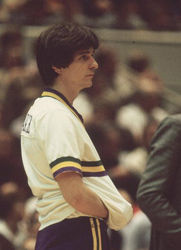 “Pistol” Pete Maravich 1979/80 | 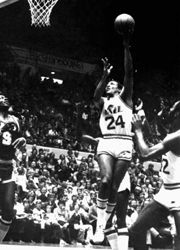 Ron Boone 1979-1981 | 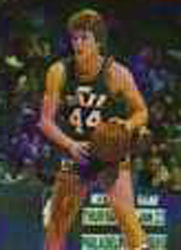 Alan Bristow 1979-1981 | 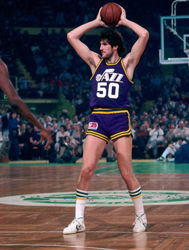 Ben Poquette 1979-1983 | 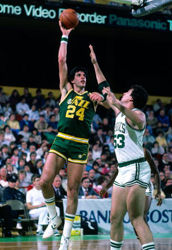 Danny Schayes 1981-1983 | 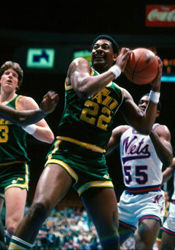 John Drew 1982-1985 |
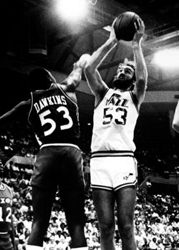 Rich Kelley 1982-1985 | 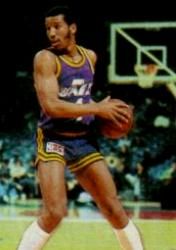 Adrian Dantley 1979-1986 | 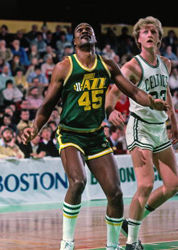 Jeff Wilkins 1980-1986 | 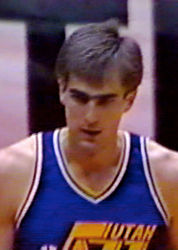 Fred Roberts 1984-1986 | 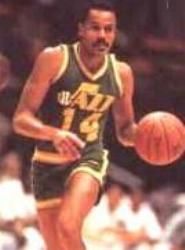 Rickey Green 1980-1988 | 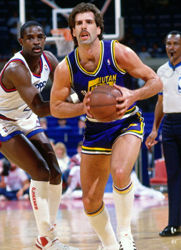 Kelly Tripucka 1986-1988 |
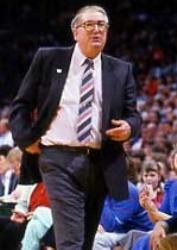 Frank Layden Coach 1981-1989 | 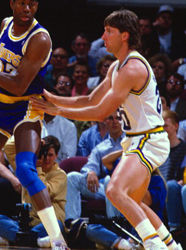 Bob Hansen 1983-1990 | 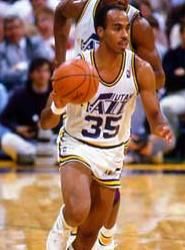 Darrell Griffith 1980-1991 1981 Rookie of the Year | 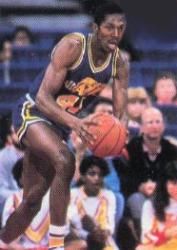 Thurl Bailey 1983-1992, 1998/99 | 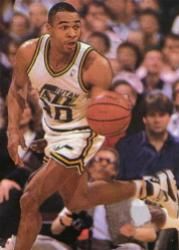 Blue Edwards 1989-1992, 1994/95 | 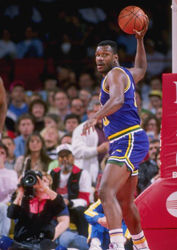 Mike Brown 1988-1993 |
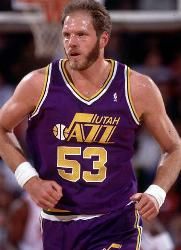 Mark Eaton 1982-1993 1985 & 1989 Defensive Player | 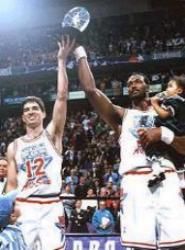 John Stockton & Karl Malone 1993 All-Star Co-MVP | 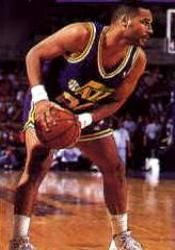 Jeff Malone 1990-1994 | 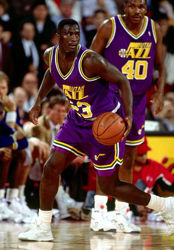 Tyrone Corbin 1991-1994 | 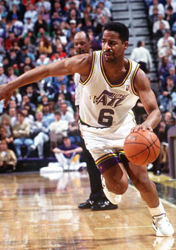 Jay Humphries 1992-1995 | 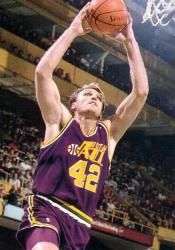 Tom Chambers 1993-1995 |
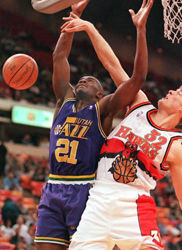 David Benoit 1991-1996, 2000/01 | 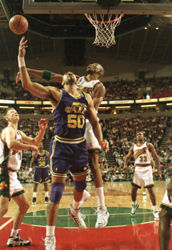 Felton Spencer 1993-1996 | 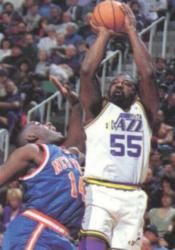 Antoinne Carr 1994-1998 | 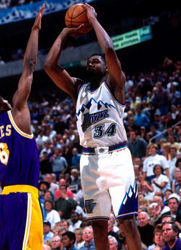 Chris Morris 1995-1998 | 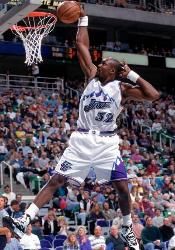 Karl Malone 1997 & 1999 NBA MVP | 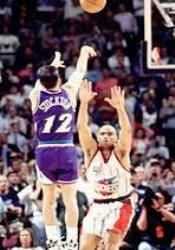 John Stockton 1997 Western Finals GW |
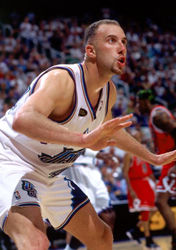 Greg Foster 1995-1999 | 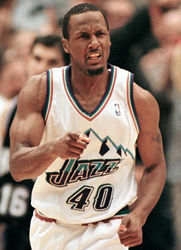 Shandon Anderson 1995-1999 | 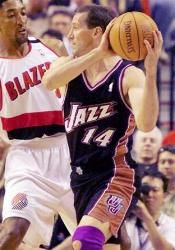 Jeff Hornacek 1993-2000 | 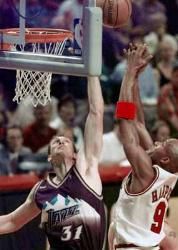 Adam Keefe 1994-2000 | 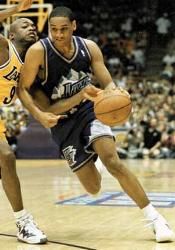 Howard Eisley 1995-2000, 2004/05 | 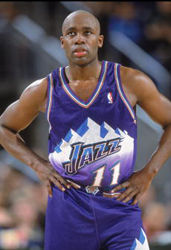 Jacque Vaughn 1997-2001 |
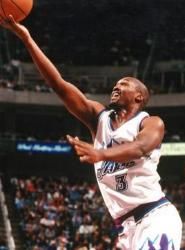 Bryon Russell 1993-2002 | 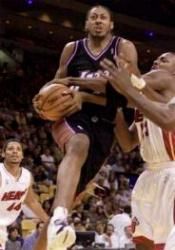 Donyell Marshall 2000-2002 | 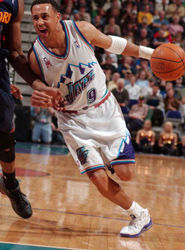 John Starks 2000-2002 | 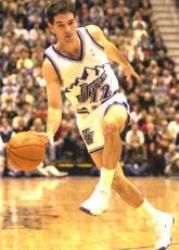 John Stockton 1984-2003 NBA Steals & Assist leader | 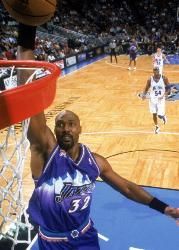 “The Mailman” Karl Malone 1985-2003 | 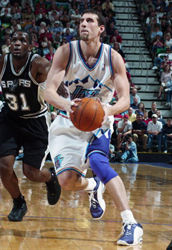 Scott Padget 1999-2003 |
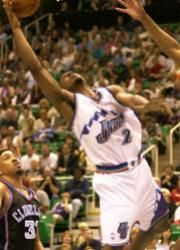 DeShawn Stevenson 2000-2004 | 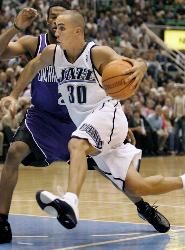 Carlos Arroyo 2002-2005 | 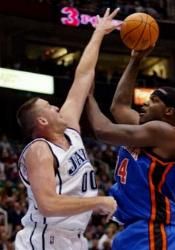 Greg Ostertag 1995-2004, 2005/06 | 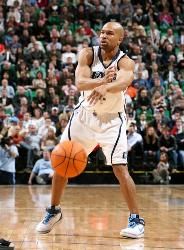 Derek Fisher 2006/07 | 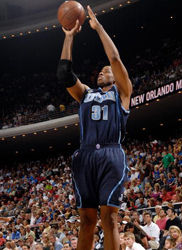 Jarron Collins 2001-2009 | 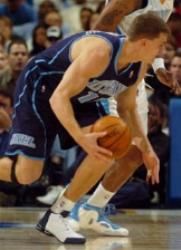 Matt Harpring 2002-2009 |
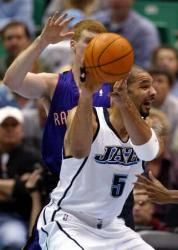 Carlos Boozer 2004-2010 | 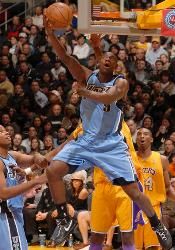 Ronnie Brewer 2006-2010 | 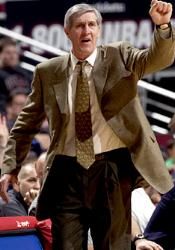 Jerry Sloan Coach 1988-2011 | 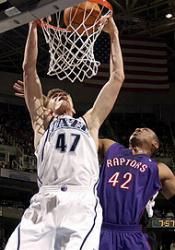 Andrei Kirilenko 2001-2011 | 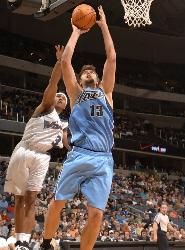 Mehmet Okur 2004-2011 | 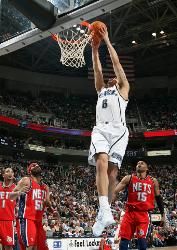 Deron Williams 2004-2011 |
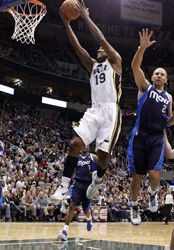 Raja Bell 2003-2005, 2010-2012 | 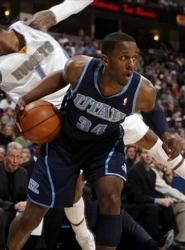 C.J. Miles 2005-2012 | 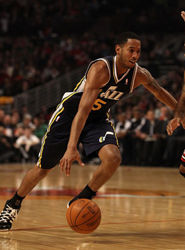 Devin Harris 2010-2012 | 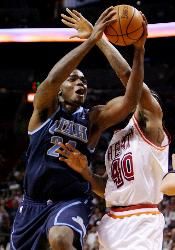 Paul Millsap 2006-2013 | 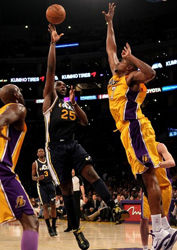 Al Jefferson 2010-2013 | 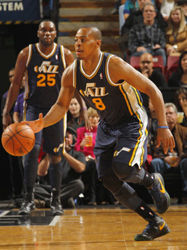 Randy Foye 2012/13 |
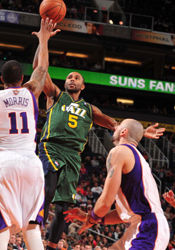 Mo Williams 2003/04, 2012/13 | 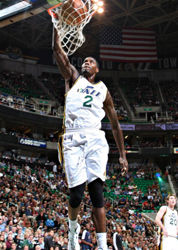 Marvin Williams 2012-2014 | 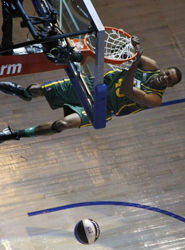 Jeremy Evans 2010-2015 | 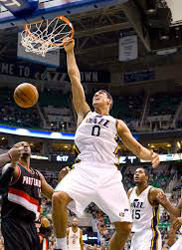 Enes Kanter 2011-2015 | 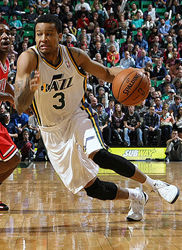 Trey Burke 2013-2016 | 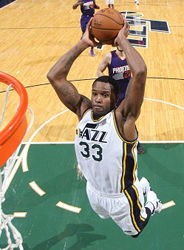 Trevor Booker 2014-2016 |
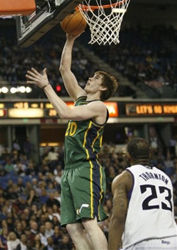 Gordon Hayward 2010-2017 | 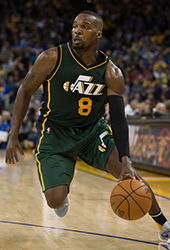 Shelvin Mack 2015-2017 | 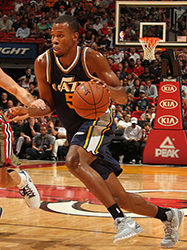 Rodney Hood 2014-2018 | 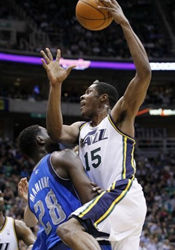 Derrick Favors 2010-2019 | 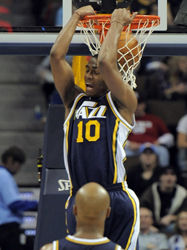 Alec Burks 2011-2018 | 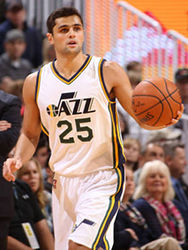 Raul Neto 2015-2019 |
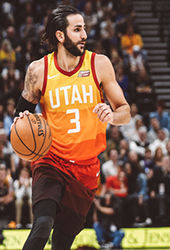 Ricky Rubio 2017-2019 | 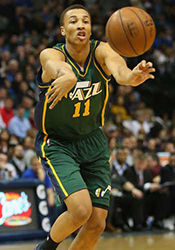 Dante Exum 2014-2020 | 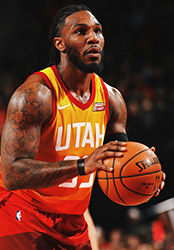 Jae Crowder 2017-2019 | 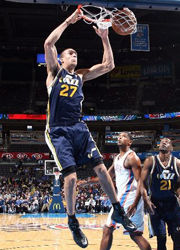 Rudy Gobert 2013-Present 2018 & 2019 Def. Player | 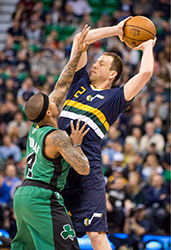 Joe Ingles 2014-Present | 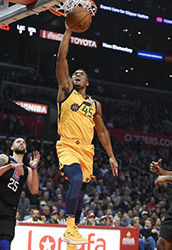 Donovan Mitchell 2017-Present |
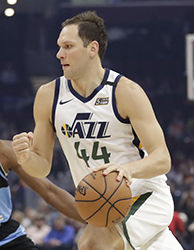 Bojan Bogdanovic 2019-Present | 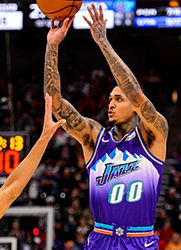 Jordan Clarkson 2019-Present | 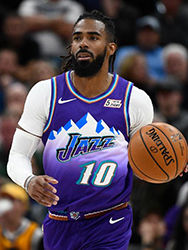 Mike Conley Jr. 2019-Present |
